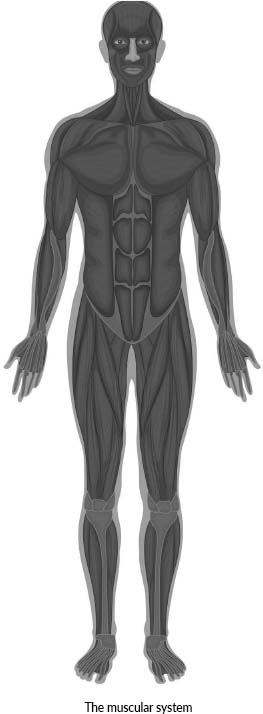

“The art of healing comes from nature, not the physician.”
—Paracelsus
The muscular system provides the means by which the body carries out all forms of movement. The body's muscles cover bones and form flesh. Interior muscles, such as the diaphragm, divide the trunk into the chest and abdomen, and the muscles that form the walls of the organs, the heart, the alimentary canal, and so on, all come under this system. There are many problems that can affect the muscles, and nature has provided many herbs that help to ease muscular ailments, usually in the form of cleansing herbs that remove toxic wastes that may be lodged in the tissues. Common complaints include pain, stiffness, sprains, and swelling in the muscles and joints. These problems can develop into arthritis, so keeping this system healthy and flexible is important as people get older. There is a choice of various herbs that help in chronic conditions that afflict the muscular system.
This traditional ancient medicine grows wild in marshy places. Also commonly known as “garden celery,” it is widely cultivated. It contains flavonoids, antioxidants, and it has diuretic properties. Its therapeutic actions were well known among Roman and Greek civilizations, and today it is used in India by Ayurvedic doctors for rheumatoid symptoms, and it is also used in Chinese medicine.
Celery seed has gained popularity in the West as a musculo-skeletal pain reliever, nerve restorative, and relaxer. Celery seed supports a healthy inflammatory response and exerts a beneficial influence on kidney health, which is important to overall vitality. Celery seed has an alkaline reaction on the blood and is therefore a good detox remedy, helping the kidneys to clear wastes, especially the salts known as urates, which are inclined to accumulate in joints causing stiffness, inflammation, and pain. Celery seed is also used for muscle cramps and spasms. It can be beneficial in the treatment of rheumatoid arthritis.

The diuretic action of celery seed extract is good for the painful inflammatory condition called gout, which is a disorder caused by the accumulation of uric acid in the blood, which causes a build-up of uric acid crystals in the big toe joint, as well as other joints in the legs, feet, hands, and arms. Gout is excruciatingly painful and disabling.
A green drink made from fresh, raw celery prepared in a juice extractor is a powerful cleanser of uric acid crystals, and celery seed tea is purifying and useful for a detox. It teams up well with willow bark.
This native shrub from the eastern United States has white, snowball-like flowers. The bark is gathered and used as an herbal medicine. As the name suggests, this herb is a powerful herbal agent that has anti-spasmodic properties and is used to relieve muscular tension and cramps. It has many therapeutic uses, especially for easing menstrual cramps and alleviating lower back pain. Its remarkable ability to relax muscular tension and spasm is attributed to its natural mineral content, which includes calcium, magnesium, and potassium—minerals that are well known for the beneficial effect they exert on muscle and nerve function. Cramp bark can also be used for relieving painful leg cramps and muscle twinges.
A good herbal muscle relaxant formula would be a combination of cramp bark with scullcap and valerian, but this may only be available from a professional herbalist.
This South African creeping plant grows in the Kalahari desert, and it has small spiny fruits that resemble hooked horns, and it is this that has given the devil's claw its name. The tubers possess anti-inflammatory, anti-rheumatic, and pain-killing properties. This herb has been used by African Sangomas and Inyangas (healers) for thousands of years. Sometimes called devil root, it has been shown to help ease backache, to increase suppleness and flexibility, and to improve mobility in the back and neck. Rheumatic or muscular pain has also been lessened by the devil's claw. Due to its anti-inflammatory properties and its muscle relaxing action, devil's claw is very beneficial for the relief of muscular problems resulting from sports injuries. It is available as tablets and capsules from health stores and holistic pharmacies.
Growing in damp, shady areas by European rivers, willow contains flavonoids and tannins. Known as an herbal aspirin, as far back as 400 BC Hippocrates prescribed willow bark infusions to relieve fevers and joint inflammation. In 1838, chemists identified the active ingredient, “salicylic acid,” in the bark of willows, laying the foundation for the world's most famous medication, which we today know as aspirin.
This analgesic pain reducer is good for mild, inflammatory rheumatic states, painful muscles and joints, gout, rheumatoid arthritis, and backache. It has anti-spasmodic actions helpful for treating lower back pain and it is available as tablets, capsules, and as a tea.